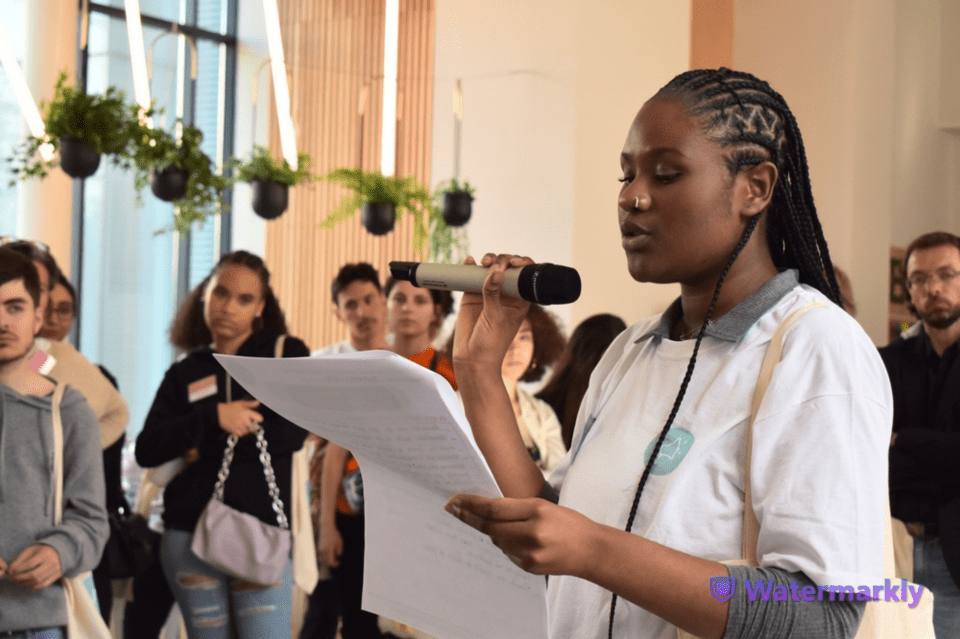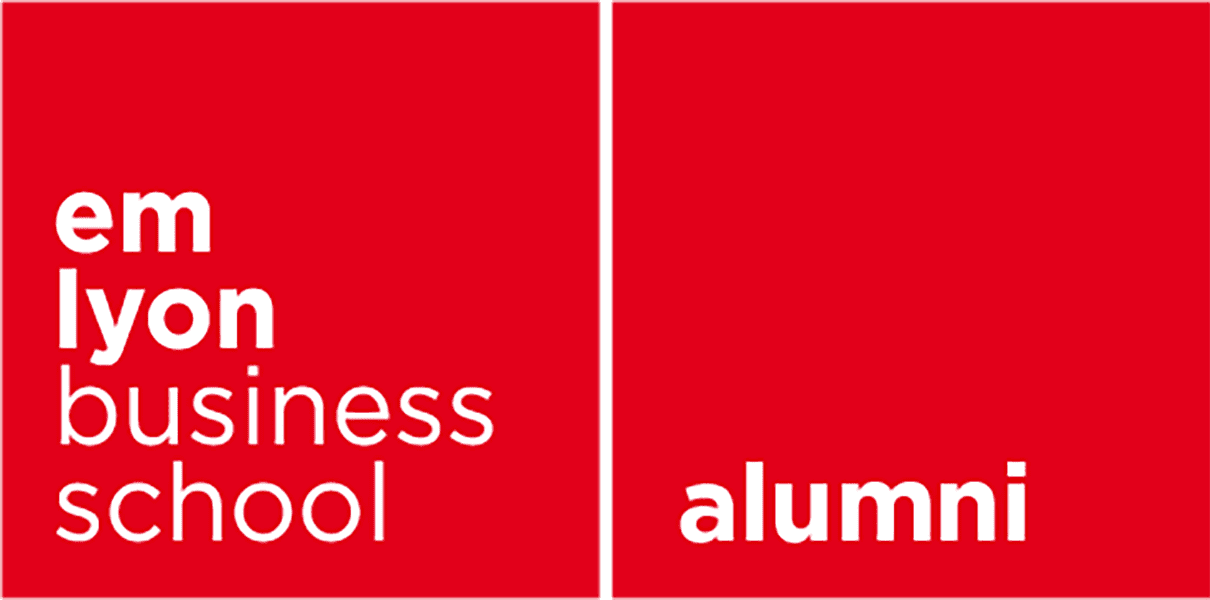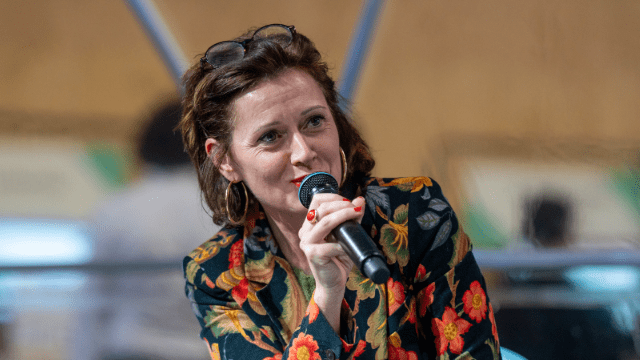📰 Le Fil | Elsa Da Costa (PGE99) - “It’s urgent to be optimistic!”
Lire l'article original en français dans le magazine Le Fil #5
Elsa Da Costa (PGE99)
CEO of Ashoka France
“It’s urgent to be optimistic!”
Helping to “make the world run smoothly”, as she says. This is the creed professed by Elsa Da Costa, who runs Ashoka France, an NGO that, for over 40 years, has specialized in spotting and supporting people and innovations that can spark change in our societies. Meet a company director whose energy and enthusiasm is catching, and who is fully committed to the general interest.
Career track 2000 Digital marketing intrapreneur (AOL France, Ubisoft, vente-privee.com, Yves Saint Laurent) 2012 Creates avisdemamamans.com, then embarks on a career in media as a freelance journalist, consultant and columnist before setting up a production company 2016 Master’s degree in journalism from ESJ Paris 2021 CEO at Ashoka France 2023 Sits on the supervisory board of the Ouest France Group and on the board of directors of the CFJ Graduate School of Journalism and of the EDF Foundation 2024 Vice-president of the Working Group No. 2 “Citizenship, Information and Democracy” of the États Généraux de l’Information consultation process |
Can you tell us a bit about Ashoka?
Ashoka is an NGO founded in India in 1980 by Bill Drayton, an American partner at McKinsey, a graduate of Harvard, Yale and Oxford universities, and still the organization’s CEO today. Ashoka is the name of an Indian emperor in the 3rd century B.C. who was one of the most tolerant, open-minded and creative leaders in the country’s history. The mission of the NGO Ashoka is to transform our model of society at its core, more specifically by identifying and supporting entrepreneurs who solve society’s problems, in order to fast-track the development of an economy that serves people and the living environment, but also to transform the way the world is represented through stories – and examples – that prove that another reality is possible. Over the last 44 years, 4,000 “change-maker” entrepreneurs have been identified and supported in 97 countries by Ashoka, which is regarded as the seventh-most influential NGO in the world.
What is the approach taken by the social entrepreneurs supported by Ashoka?
Our “fellows”, as we like to call them, are involved in a systemic, non-cosmetic approach to change. They attack the root cause of the problems – difficulty obtaining housing, education, employment, food, a sustainable environment or healthcare, etc. – and place those experiencing the difficulty at the heart of the solution. Our method is empowerment. In other words, revealing to those concerned that they have the power to take action to solve the problem identified. Ashoka encourages them to build fully-fledged lasting, robust ecosystems, involving such varied stakeholders as private companies, governments, civil society organizations, donors, media companies or universities. Of course, the process is devoid of any notion of financial gain. Moreover, 82% of Ashoka fellows have seen their innovations reproduced through strategic partnerships, open source arrangements or licenses.
Can you tell us more about Ashoka France, of which you have been the CEO for the past four years?
In France, 86 innovative social entrepreneurs have been selected since 2006 and are receiving tailored support from a team that includes some 15 permanent members, over 50 philanthropic mentors and around 10 partners working on a skills sponsorship basis. Their initiatives and the fields in which they operate vary widely (see box below). Moreover, we are forging ties between these entrepreneurs and companies such as EDF and L’Oréal Paris so that social innovation can spread through the whole economy through hybrid partnerships leveraging each stakeholder’s strengths and goals. The authorities are taking inspiration from this deployment, in the light of the government policy of 15 million euros within the framework of the partnership1 between the fellow Réseau Éco Habitat, EDF and Ashoka.
Ashoka France is also the driving force behind far-reaching and radical changes in the organizations and bodies in charge of issues to do with diversity, the environment and education: ecological planning, public policy on severe fuel poverty, or round-table talks on information, in which I tabled the proposal to extend the term of “société à mission”, or benefit corporation, to include the media and the unprecedented study on journalists’ well-being.
"Ashoka is regarded as the seventh-most influential NGO in the world."
What with wars, natural disasters, pandemics, global warming, the rise of populisms and violence, the state of the world is worrying. How can we find the strength to take action in this stress-inducing context?
We are living in dizzying times. Gramsci would tell you that monsters come out in the half light2. But I firmly believe that “magical animals” can come out of the woodwork or stem from lethargy or renunciation. It’s urgent to be optimistic! And I’m desperately optimistic; that’s what spurs me into action! Everyone today is facing the triple question of their priorities, their responsibility and their coalitions. Our mission is also to persuade as many people as possible to make a choice and to take action, so they don’t have to put up with things. Ashoka guides and supports well-meaning men and women by training them in 21st century issues and challenges so they can help make the world run smoothly. A world where intergenerational relations are no longer top-to-bottom and where we can move forward as a close-knit unit. Through initiatives such as “Your Voice Counts” or the “Youth Assembly”, we aim to teach a culture of citizen involvement right from childhood, to highlight the achievements of the social and solidarity economy, and to elicit proposals that involve the young generations in building the world. The partnership we are building with emlyon illustrates our common desire to guide and support leaders with the issues of the future, in the belief that our students are not simply learners but an integral part of their course of studies.

Launched by Ashoka in 2023, the Youth Assembly drew together young people and decision-makers to work together on defining success in the 21st century. A total of 45 proposals were drawn up to address issues such as protecting the planet, and young people’s well-being, training and entry into the workforce...
What about you? What sort of youth did you have?
I’m a pure product of France’s republican school system. Right from a young age, I was immersed in multiculturalism, alongside a French mother who was a senior staff nurse and had grown up in Morocco, and a Portuguese father who was an engineer and had fled the Salazar dictatorship. Growing up with them, from a very early age I developed a humanistic political awareness.
What was your academic path?
In the beginning, this path was guided by my parents’ wishes. As the time-honored expression goes, they dreamed of a “good job” for their two daughters and encouraged me to apply for the most prestigious business school: HEC. I want them to be proud of me, so I go along with this order, which is a mixture of parental love and the negation of their offspring’s desires... I’m a very good student, drawn more to literary subjects than scientific ones. I’m glad I was accepted into emlyon: I love it’s educational project and the entrepreneurial vibe. I have wonderful memories of the campus, the courses and the community life. As vice-president of the student association, I’m finding my feet when it comes to managing a group. Everything I try out and learn at emlyon will be useful in my work life. And I will always follow my own path.
What have your career highlights been?
I began by working in digital marketing for over 10 years, in big companies and in a wide variety of industries such as AOL France, Ubisoft, vente-privee.com and Yves Saint Laurent. I enjoyed getting to understand consumer behavior and I was fascinated by innovation. I worked in intrapreneurial roles, bringing my own personal, often humanistic touch. And I reacted when something went against my deep-seated convictions. At Ubisoft in 2006, after being made to feel uncomfortable by the Lapins Crétins’ violence dressed up as humor, I formed a partnership with UNICEF under which Rayman became the association’s ambassador and issued the following introductory recommendation: “Be nice to others”.
In 2011, I wanted to give power back to the consumer, so I changed tack and set up avisdemamans.com, an AFNOR-accredited website that remained in existence until 2022. After frequently being invited to appear on the maternelles TV show on France 5, I became a columnist and cracked the door to the world of media.
What will persuade you to take up the profession of journalist on a permanent basis?
The terrorist attacks on Charlie Hebdo. I’m horrified and seized by an irresistible urge to bear witness to this event. If it’s not talked about, it doesn’t exist. I obtained my Master’s degree at the school of journalism in Paris. I worked for a while at BFM, but the editorial line there was diametrically opposed to my vision of the news. I soon became a producer and director of documentaries about my favorite subjects: education, disability, the place of women, youth and transmission. I work with France Télévision, RTL, the Huffington Post and others. In 2017, during the French presidential election, I launched, free of charge, the platform jecomparelesprogrammes.fr, which went on to register 600,000 logins in three weeks! In 2018, I co-produced and directed a documentary series called Le lobby de Poissy - les enfants s’engagent pour la planète, which was broadcast on France TV Éducation. The following year, I coordinated the “European Declaration of the Rights of the Planet and Living Beings”, a text drafted by 310 children from 10 European countries. Its 18 proposals dealt with plastic pollution, transport, the protection of ecosystems, and it was presented to the European Commission and the European Parliament. It’s a real turning point. These many and varied meetings with amazing change drivers were a delight, but our declaration went unheeded because of Covid. My watchword is act and have a real impact, albeit a modest one, on the way of the world. My mission as CEO of Ashoka France is a fulfilling one. We are constantly taking an active role in “doing”, “transforming” and “changing”!
"Like culture in general, information is not a commodity, it’s a common good."
You also sit on the supervisory board of the Ouest France Group and on the board of directors of the CFJ Graduate School of Journalism. What are your missions in these two organizations?
Information shapes the way citizens see the world. By welcoming me onto its supervisory board, the Ouest-France Group signals its desire to be guided and supported by one of the voices of the social and solidarity economy. What’s more, being involved in managing one of the most prestigious journalism schools in France, after being elected treasurer of the CFJ Graduate School of Journalism, lets me express my vision of a brand of journalism that observes other realities: those of sustainable and inclusive economic models.
What dangers are posing a threat to information?
For the past 20 years, we have been experiencing an unbridled acceleration of the technological revolution. Very few limits have been set on this revolution. High-quality information is information that has been produced in accordance with the rules of professional conduct. It must be able to exist with guaranteed pluralism and the pre-existence of an ability to tell the truth from falsehood. The dangers threatening it today are multiform and interconnected: free access to unverified information on social media, the absence of an information culture from a young age, the absence of a culture of facts, but also the absence of a permanent economic model for information societies. We should extend the quality of benefit corporation to the media. This status would make it possible to formalize social-impact missions such as education about information, diversity in editorial teams or developing critical thinking. Like culture in general, information is not a commodity, it’s a common good.
A final word to conclude this interview?
The word “economy” then. It comes from the Ancient Greek word “oikonomia”, which means “household management”. The Earth is humanity’s common home. Let’s protect it and make it welcoming and livable for all for the sake of fairness and freedom.
1- Ashoka France 2023, p. 53 (https://bit.ly/41yuNsx)
2- Antonio Gramsci (1891-1937), Italian philosopher, writer and political theorist: “The old world is dying, and the new world struggles to be born; now is the time of monsters” (in the English translation of the Prison Notebooks).
Committed, trail-blazing fellows! The generous Askoka fellows lack neither ideas nor talent. Marie Trellu Kane, for instance, inspired the launch of the civic service in France by setting up, 20 years ago, the Unis-cité association. For nine months, young people between the ages of 16 and 25 take part in collective initiatives to help those most in need, such as the elderly, the homeless, refugees or disabled people. Stéphane de Freitas, for his part, set up Eloquentia, which gives secondary and tertiary-level students the opportunity to learn public speaking, build their self-confidence and believe in their power to pass on a message that will be useful to society. Two projects are being led by emlyon alumni fellows: Gaële Regnault (PGE98) brings LearnEnjoy, a platform of solutions that completely overturns the system of caring for and handling autism. Frank Escoubès (PGE89) co-founded Bluenove, which develops digital platforms that enable citizens to collaborate with companies and governments to solve complex social problems. |
Lire l'article original en français dans le magazine Le Fil #5

Commentaires0
Veuillez vous connecter pour lire ou ajouter un commentaire
Articles suggérés


